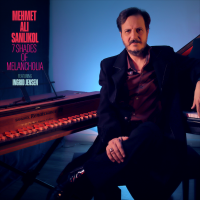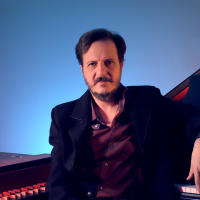Home » Jazz Musicians » Mehmet Ali Sanlikol
Mehmet Ali Sanlikol
Grammy nominated composer and CMES Harvard University fellow (2013-15) Mehmet Ali Sanlıkol made his Carnegie Hall debut in April 2016 premiering his commissioned piece Harabat/The Intoxicated with the American Composers Orchestra. Other recent works have been heard at Tanglewood’s Ozawa Hall and on A Far Cry string orchestra’s several different recordings. He hails from Cyprus and Turkey, and is a Jazz pianist, a multi-instrumentalist, a singer, an ethnomusicologist as well as a full-time faculty member at the New England Conservatory. Sanlıkol was the recipient of numerous respected awards including the South Arts Jazz Road Creative Residency Grant in 2021, The Aaron Copland Fund for Music Grant twice in 2016 and 2020 as well as the New Music USA Project Grant in 2020 and has been praised by critics all over the world for his unique, pluralist, multicultural and energetic musical voice. The Boston Globe noted that Sanlıkol’s “music is colorful, fanciful, full of rhythmic life, and full of feeling. The multiculturalism is not touristy, but rather sophisticated, informed, internalized; Sanlıkol is a citizen of the world”, “…and he (Sanlıkol) is another who could play decisive role in music’s future in the world.”
A musical polymath, Mehmet Ali Sanlıkol has composed for, performed and toured with international stars and ensembles such as Dave Liebman, Bob Brookmeyer, Billy Cobham, Esperanza Spalding, Gil Goldstein, Antonio Sanchez, Anat Cohen, Tiger Okoshi, Tommy Smith, Miguel Zenón, The Boston Camerata, The Boston Cello Quartet, A Far Cry string orchestra, American Composers Orchestra, Okay Temiz, Erkan Oğur and Birol Yayla. Sanlıkol’s unique blend of jazz composition and Turkish music has been praised by the Boston Globe as “a true fusion of jazz and folkloric Turkish language and colors.” Sanlıkol pairs Turkish instruments such as zurna (double reed wind), ney (end-blown flute), kös (large kettledrums) and nekkare (small kettledrums) with the jazz orchestra/combo to perform his Turkish music-influenced compositions, in which Turkish makam (mode) and usul(rhythmic cycles) are intertwined with modern jazz as well as specifically film noir influenced music. To achieve the same goal on keyboard instruments he has designed and conceived the SANLIKOL Renaissance 17, a digital microtonal keyboard with 17 keys per octave.
Sanlıkol studied western classical piano with his mother Fethiye Sanlıkol and started giving piano recitals as early as age five. Later on he studied with the internationally acclaimed Turkish composer/pianist Aydın Esen and won a scholarship to Berklee College of Music. While at Berklee Sanlıkol studied jazz composition with such accomplished composers like Herb Pomeroy and Ken Pullig. After studying with composers George Russell, Bob Brookmeyer and Lee Hyla, in the year 2004 Sanlıkol completed his Doctor of Musical Arts Degree in Composition. During his doctoral studies Sanlıkol also focused on Turkish music and ethnomusicology as a result of which he helped find the organization DÜNYA based in Boston, Massachusetts. Sanlıkol is the president of DÜNYA, a musicians’ collective dedicated to contemporary presentations of Turkish traditions, alone and in interaction with other world traditions, through musical performance, publication, and educational activities. Since its founding Sanlıkol has produced, performed and delivered talks at over two hundred DÜNYA events. DÜNYA has also released 17 albums, 3 singles, a concert DVD, a feature film of Sanlıkol’s opera “Othello in the Seraglio” and a documentary film. The unique nature and the success of DÜNYA resulted with Mehmet Ali Sanlıkol going on the air numerous times on NPR and PRI.
Read moreTags
Mehmet Ali Sanlikol, featuring Ingrid Jensen: 7 Shades of Melancholia

by Jack Bowers
Although he was born and raised in Turkey, pianist, composer and educator Mehmet Ali Sanlikol says he was not a student of Turkish musical traditions until after he arrived in the United States more than thirty years ago. By the late '90s, however, Sanlikol, by then a successful working jazz musician, had reconnected with his Turkish roots, studied its grammar and played hundreds of concerts focused on the music of his homeland, blended with elements of American jazz and other ...
Continue ReadingFrom Tony Bennett to Mehmet Ali Sanlikol

by Jerome Wilson
This show is a mixture of vocals, flutes, Middle Eastern jazz, and much more. Artists heard on the show include Mehmet Ali Sanlikol, Tony Bennett, Myra Melford, Lew Tabackin, and Cal Tjader. Playlist Henry Threadgill Sextett “I Can't Wait Till I Get Home" from The Complete Novus & Columbia Recordings of Henry Threadgill & Air (Mosaic) 00:00 Stan Getz “Invitation" from My Foolish Heart: Live at the Left Bank (Label M) 00:56 Cory Weeds “Blossoms In May" from ...
Continue ReadingMehmet Ali Sanlikol: Turkish Hipster: Tales From Swing To Psychedelic

by Jack Bowers
Those who believe the term Turkish Hipster has to be an oxymoron should get to know composer/arranger/multi-instrumentalist Mehmet Ali Sanlikol, a Turk whose seventh album, subtitled “Tales from Swing to Psychedelic," is about as hip as can be. Sanlikol knows where is going but chooses to get there in his own special way, using every weapon in his musical arsenal to create vivid sound pictures whose jazz components rest solidly within a Middle Eastern framework that set them apart from ...
Continue ReadingMehmet Ali Sanlikol: The Rise Up

by Jack Bowers
Yes, the boundaries of jazz have spread far beyond any perimeter its early enthusiasts could have envisioned. Yes, the idea for composer / arranger Mehmet Ali Sanlikol's The Rise Up was advanced by saxophonist Dave Liebman--and yes, there's no way to downgrade his jazz credentials. Liebman, Sanlikol says, asked that the piece draw from Turkish and Sephardic Jewish traditions as well as cultural and historical experiences, and feature him as soprano saxophone soloist. Two years later, Sanlikol completed a picturesque ...
Continue ReadingMehmet Ali Sanlikol & Whatsnext?: Resolution

by Angelo Leonardi
Nato a Istanbul da genitori turco-ciprioti, Mehmet Ali Sanlikol è un orchestratore, etnomusicologo e pianista che ha studiato composizione a Berklee con Herb Pomeroy e al New England Conservatory con George Russell e Bob Brookmeyer. Suona professionalmente da due decenni ed è un prolifico autore che spazia dal jazz orchestrale alla dimensione classica, dalla musica tradizionale turca a fusioni con disparate forme etniche e popolari. Questo lavoro orchestrale segue What's Next del 2014 e si spinge nella sintesi ...
Continue ReadingMehmet Ali Sanlikol & Whatsnext?: Resolution

by Dave Wayne
Turkish multi-instrumentalist, composer and ethnomusicologist Mehmet Ali Sanlikol has a wide variety of interests and clearly isn't afraid to think big. His second album, Resolution features two distinct ensembles: a 19-member jazz orchestra and a 12- member jazz combo. Each track, except for “A Dream in Nihavend" and the set closing “Love Theme from Ergenkon," features jazz luminaries such as Anat Cohen, Dave Liebman, Tiger Okoshi, and Antonio Sanchez as guest soloists. And, despite Sanlikol's liberal application of electronics and ...
Continue ReadingMehmet Sanlikol: What's Next?

by Jack Bowers
After listing the personnel (which varies on every track) for Turkish-born composer Mehmet Ali Sanlikol's new CD, What's Next?, there's scarcely room for a review. Well, perhaps a small one, starting with the fact that Sanlikol, a graduate of the Berklee School of Music and New England Conservatory, first studied classical piano with his mother, Fethiye Sanlikol, and by age five was presenting public recitals in his homeland. After further studies, with Turkish composer / jazz pianist Aydin Esen (to ...
Continue ReadingZildjians, Atlantic Records And Jazz: The Legacy Of Istanbul In America Features Jazz Orchestra And A Mehter Band On Thursday, February 27 In Boston

Source:
Braithwaite & Katz Communications
The Jazz Studies department and the Intercultural Institute at NEC present a full-day event on Thursday, February 27 which includes a workshop, presentations, and a panel discussion followed by a concert featuring the NEC Jazz Orchestra and a mehter band (so-called “Ottoman Janissary Band”). The 7:30 p.m. concert at Jordan Hall also features the world premiere of Echoes from a Forgotten Past by NEC faculty member Mehmet Ali Sanlikol. Guest performers include saxophonist Sam Newsome and drummer and faculty member ...
read more
"The multiculturalism is not touristy, but rather sophisticated, informed internalized; Sanlıkol is a citizen of the world", "...and he (Sanlıkol) is another who could play decisive role in music’s future in the world." - Boston Globe “A true fusion of jazz and folkloric Turkish language and colors.” - Boston Globe
Primary Instrument
Multi-instrumentalist
Location
Boston
Credentials/Background
Full-time faculty at New England Conservatory
Bob Brookmeyer
tromboneMiles Davis
trumpetAydin Esen
pianoHerbie Hancock
pianoHerb Pomeroy
trumpetMcCoy Tyner
pianoWeather Report
band / ensemble / orchestraPhotos
Music
A Capoeira Turca (Baia Havası) featuring Anat Cohen
From: Turkish Hipster: Tales From...By Mehmet Ali Sanlikol

















